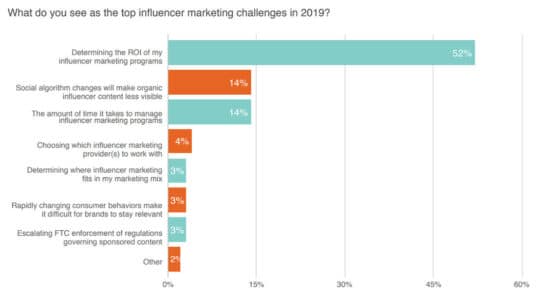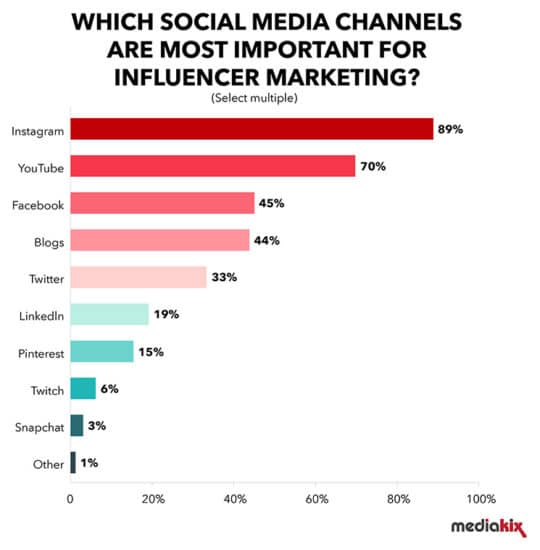Influencer marketing has paved the way for businesses to reach wider audiences and grow their customer bases. However, it does come with its fair share of challenges. About 52% of marketers found that measuring the ROI of their influencer marketing campaigns was their topmost challenge.
Image via Linqia.
But it’s a necessary process. Without measuring your ROI, it’s difficult to figure out if your campaign was successful or not. But that’s not all. Here are some other reasons why you need to measure influencer marketing ROI.
Why is it important to measure your influencer marketing ROI?
The primary goal of every marketing campaign is to drive the desired results. But how can you figure out if you are getting closer to what you set out to achieve? You need to evaluate if your efforts are reaping the benefits you want.
That’s why it is important to track and measure whether your campaigns are performing well. Evaluating your campaign can help you determine which areas you need to improve upon.

If you aren’t headed in the right direction, measuring your ROI can provide direction for course correction. That’s not all. Measuring the ROI of your influencer marketing campaigns can also help you:
Recommended for you: Your Complete Guide to Run a Perfect Influencer Marketing Campaign.
1. Identify influencers who generate the best results
 Most influencers charge money. So, it’s best to work with those influencers who have a better chance of delivering a good ROI. Ideally, you need to work out an arrangement that is low in risk and high returns. For that, you need to identify influencers who can drive the best results.
Most influencers charge money. So, it’s best to work with those influencers who have a better chance of delivering a good ROI. Ideally, you need to work out an arrangement that is low in risk and high returns. For that, you need to identify influencers who can drive the best results.
But how can you find the right influencers? You can start by checking whether the chosen influencer drives genuine engagement. Check how many people are liking, commenting, and sharing their content compared to the number of followers they have. Engagement should be a key deciding metric for you.
Also, take a look at the quality of comments they get on sponsored posts. If you find generic comments like “Awesome” or “Wow,” they may have come from bots. Genuine followers are likely to ask questions or give genuine compliments. You’ll be wasting your budget if you spend money on fake followers as they cannot help you reach your desired goals.
Measuring ROI will help you figure out which influencers are driving your growth. These are the influencers with whom you need to continue building your partnership. Based on your findings, you can make smarter business decisions.
2. Identify influencers who fail to drive results
 Another major benefit of tracking the ROI of your influencer marketing campaign is that it enables you to find bottlenecks in your processes. It will help you pinpoint if you are actually achieving as much as you had expected at the beginning of your campaign.
Another major benefit of tracking the ROI of your influencer marketing campaign is that it enables you to find bottlenecks in your processes. It will help you pinpoint if you are actually achieving as much as you had expected at the beginning of your campaign.
So, if your goal is to boost sales, you should keep track of your monthly revenue. If it hasn’t increased after an influencer campaign, it’s obvious that the campaign was a failure. A failed campaign also reflects poorly on the performance of the influencer. If the influencer is not driving results, then you should let them go and find another who will help you achieve your influencer marketing goals.
3. Figure out your top-performing content
 By measuring your influencer marketing ROI, you can figure out which content is driving results. When you know what kind of content resonates best with your audience, you can produce more similar content. Keep track of your website traffic and engagement on social media posts to find out your top-performing content.
By measuring your influencer marketing ROI, you can figure out which content is driving results. When you know what kind of content resonates best with your audience, you can produce more similar content. Keep track of your website traffic and engagement on social media posts to find out your top-performing content.
Also, try to analyze why a particular post received a good response from the audience. It could be the tone, presentation, the influencer, or even the timeliness. Once you figure out what works for your audience, you have the golden formula in your hands. Based on the findings, you can also optimize your other posts that aren’t performing well.
4. Optimize your influencer marketing strategy for better results
 Want to get the most bang for your buck? Obviously, you do! To get the best results, you need to optimize your campaign. After all, you need to make sure you are utilizing your time and money wisely. As we previously discussed, measuring ROI can help you discover what kind of content drives more engagement. It’s also an excellent opportunity to determine which influencer brings more conversions.
Want to get the most bang for your buck? Obviously, you do! To get the best results, you need to optimize your campaign. After all, you need to make sure you are utilizing your time and money wisely. As we previously discussed, measuring ROI can help you discover what kind of content drives more engagement. It’s also an excellent opportunity to determine which influencer brings more conversions.
What’s more, you ask? Based on your findings, you can adjust your influencer marketing strategy to maximize returns. At the same time, measuring your ROI will also help you find out which social media channel works well for your audience. Metrics measured will help you realize what channels bring in the best results too. Instagram may be the most important channel for influencer marketing, but you can also diversify to other channels like YouTube, Facebook, blogs, and Twitter.
Image via Mediakix.
Wondering how to get the most out of your efforts? To increase your returns and to optimize your campaigns, it’s a good idea to start paying your influencers based on their performance. Paying per performance can drive the influencer to provide more quality content to help you achieve your defined benchmarks.
A performance-based payment model promotes accountability. Of course, high-tier influencers may not agree to such an agreement. But if you are collaborating with nano- and micro-influencers, it can be a great way to drive results. Also, you can also amplify the top-performing influencer content with paid media. It will help you increase impressions and reach. Share the influencer content on your social media channels too to drive more engagement.
You may like: How to Successfully Create an Influencer Marketing Campaign for ECommerce?
5. Spend your influencer marketing budget wisely
 Financial planners always emphasize the need to keep track of your cash inflow and outflow. That’s because it can help you plan your budget efficiently. The same concept applies to your influencer marketing spend as well. How?
Financial planners always emphasize the need to keep track of your cash inflow and outflow. That’s because it can help you plan your budget efficiently. The same concept applies to your influencer marketing spend as well. How?
Measuring your ROI can help you determine if you are spending your money wisely on influencer marketing strategies. It also allows you to come up with a payment strategy that maximizes results. For example, as mentioned earlier, by paying per performance, the influencer produces good content so that they can get good compensation. In the process, you also benefit as good content will lead to more engagement and more conversions.
By tracking where and how you spend your money throughout the campaign, you can analyze the performance of each influencer. If your resources are not being spent well, you can restructure your strategy accordingly. It will also help you determine what kind of paid content drives more results. You can then work with the influencer to adjust the content type and ensure every penny spent leads to maximum results.
Bonus: Quick tips to calculate the ROI of your influencer marketing campaigns

Now you know that it’s important to calculate the ROI of your influencer marketing campaign. But how can you measure it? Many marketers find measuring their ROI to be a tough challenge. It’s not tough if you are clear about your goals from the onset.
Let’s discuss briefly how you can track and measure the effectiveness of your influencer marketing campaigns:
- Define your KPIs: To measure the success of your campaign, determine what exactly you want to achieve from your campaign. You may want to boost your conversion rate, referral traffic, engagement rate, or reach. Based on your goals, it’s important to define your KPIs.
- Track your site traffic: Use custom links to track the number of website visits that you get via an influencer. Also, use Google Analytics to find the source of your traffic, demographics, the content they liked, bounce rate, time spent on site, etc.
- Track your audience growth: Keep an eye on your follower count. Ideally, you should gain more followers during and after an influencer marketing campaign.
- Track influencer-driven sales: Through promo codes, affiliate links, and UTM parameters, check if your sales are increasing.
- Measure audience engagement: Track engagement metrics, including likes, comments, clicks, and shares. Use tools for social listening to track both direct and indirect brand mentions. With this strategy, you can also find out if the influencer collaboration helped you boost your brand awareness.
- Track brand reach: Use social media analytics and user-generated content to see if your brand reach has amplified.
- Leverage influencer marketing tools: Manually keeping tabs on each of the metrics mentioned above can be cumbersome.
Is there a better way out? Absolutely. Influencer marketing tools allow you to track all influencer activity easily. From one dashboard, you can access the total amount the campaign spent, and the number of purchases made by customers.
You may also like: How to Hack Instagram Marketing Using Influencers?
Ready to Measure Your Influencer Marketing ROI?

You can’t improve what you can’t measure. So, it’s crucial to invest time in measuring the results of your influencer marketing campaign results. It’s a prerequisite for developing a winning influencer marketing strategy.
By measuring your influencer marketing ROI, you can figure out the effectiveness of your campaign and change the way you work with influencers. This, in turn, can help you get more out of your influencer marketing strategy.
Do you have any questions about measuring your influencer marketing ROI? Please let us know in the comments.
This article is written by Dawn Bowman. Dawn is the Managing Editor for Shane Barker Consulting. She was previously the Managing Editor at KillerStartups and Startups.com. In her spare time, she writes short stories and song lyrics.


 This article is written by Dawn Bowman. Dawn is the Managing Editor for Shane Barker Consulting. She was previously the Managing Editor at KillerStartups and Startups.com. In her spare time, she writes short stories and song lyrics.
This article is written by Dawn Bowman. Dawn is the Managing Editor for Shane Barker Consulting. She was previously the Managing Editor at KillerStartups and Startups.com. In her spare time, she writes short stories and song lyrics.




